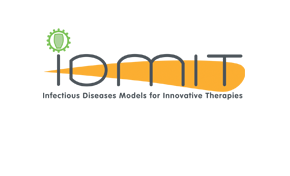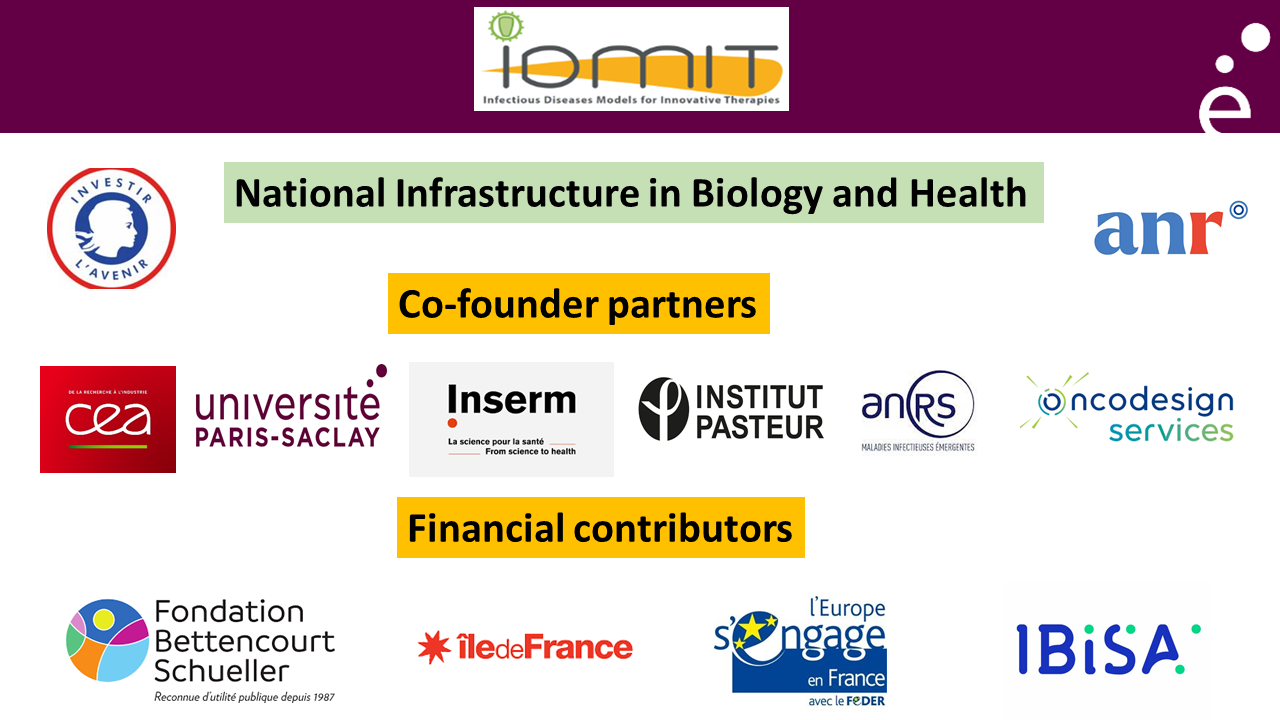About us
Partners
Co-founder partners
- CEA, DRF/JACOB/IDMIT Joint Research Unit 1184
- Institut Pasteur,
- Inserm,
- University Paris-Saclay,
- ANRS,
- Oncodesign Services
CEA, the teams of the Fundamental Research Division(DRF) at the CEA have demonstrated their ability to combine their skills and infrastructures to focus on issues of importance to society, such as Energy and Health. Through fundamental research in biology, physics and chemistry, the basic research division (DRF or CEA Sciences) strongly contributes to all of CEA research programs in many fields of expertise, from renewable and nuclear energy, to health, lasers, micro and nanotechnology. Within the Jacob Institute, the IDMIT Department IDMIT carries out internationally recognized cutting-edge research on human infectious diseases, including in particular those caused by HIV, emerging viruses, bacteria, parasites and has unique expertise in the use of non-human primate (NHP) models. The IDMIT teams make major contributions to several international research networks and to national and European research programs.
Institut Pasteur is a private, non-profit foundation. Its mission is to help prevent and treat diseases, mainly those of infectious origin, through research, teaching, and public health initiatives. Institut Pasteur is an internationally renowned center for biomedical research that stands out in many disciplines. It aims at responding to the major public health challenges of today, for example antibiotic resistance, the impact of microbiota (formerly called gut flora) on our health, promoting healthy aging, etc. Institut Pasteur is engaged on these fronts and its discoveries improve prevention, diagnosis and treatment of infectious diseases (Ebola, malaria, AIDS, tuberculosis, Zika, etc.), neurodegenerative diseases (Alzheimer’s, Parkinson’s, etc.), cancers (uterine, stomach, etc.), autism, etc. It has placed its scientific expertise in this domain and in vaccination at the disposal of this project. It also contributes its knowledge and experience in the use of animal models of human diseases. With its internationally renowned teaching activities, Institut Pasteur also makes a major contribution to the training activities implemented within this infrastructure. By deciphering the fundamental mechanisms of living organisms, its researchers contribute to the advancement of knowledge that leads to cutting-edge medical applications, ultimately improving public health.
University Paris-Saclay was born from the shared ambition of French universities, grandes écoles and national research organisations. As a leading university in Europe and the world, it covers the fields of science and engineering, life sciences and health, and humanities and social sciences. The university’s science policy closely intertwines research and innovation, incorporating both basic and applied science to tackle major societal challenges.
Université Paris-Saclay offers a varied range of undergraduate to doctorate level degrees, including programmes with its grandes écoles, all of which are focused on achieving student success and employability. The university prepares students for an ever-changing world where the ability to think critically, remain agile and renew one’s skills are crucial. Université Paris-Saclay also offers a comprehensive range of lifelong learning courses.
Located to the south of Paris, the university extends across a vast and rich local area. Its location strengthens both its international visibility and its close ties with its socio-economic partners (major companies, SMEs, start-ups, local authorities, charities).
Université Paris-Saclay also appears in the world’s Top 20 universities according to the Academic Ranking of World Universities 2022. The ranking ranks the world’s most productive research universities and is published annually by Shanghai Jiao Tong University. Université Paris-Saclay is ranked as France’s top university.
Inserm, the French National Health and Medical Research Institute, is responsible for biomedical research. Founded in 1964, Inserm is a public scientific and technological institute which operates under the joint authority of the French Ministries of Health and Research. The institute is dedicated to biomedical research and human health, and is involved in the entire range of activities from the laboratory to the patient’s bedside. It also partners with the most prestigious research institutions in the world that are committed to scientific challenges and progress in these fields. Its Institute of Microbiology and Infectious Diseases is responsible for co-ordinating studies on infectious diseases, vaccine biology and prevention strategies. The principal goals of the IMMI are to support research on viruses, bacteria and parasites and to characterize human infectious diseases through studies of host-pathogen relationships, anti-infection agents and vaccine escape. This research requires appropriate facilities for studying NHPs, at a suitable confinement level, to strengthen investigations of the fundamental mechanisms underlying infectious diseases, their transmission and innovative therapeutic and preventive strategies.
ANRS, Emerging Infectious Diseases is an autonomous agency of Inserm that facilitates, evaluates, coordinates and funds research into HIV/AIDS, viral hepatitis, sexually transmitted infections, tuberculosis and emerging and re-emerging infectious diseases. We address the scientific challenges raised by emerging diseases and ensures the implementation of solutions in times of crisis.
While our agency plays a central role as an aid in preparing responses to future infectious threats, it also plays a particular role withinin the French and international scientific landscape in the response to epidemic crises that occur and fall within its remit: it acts as a reference player, inter-institutional pilot and research accelerator.
In the event of epidemic crises, the agency uses a multimodal system which consists of three progressive response levels:
- Level 1: Implementation of an enhanced scientific watch in the event of an epidemic crisis; definition of prevention research priorities (crisis preparedness) with the scientific communities, expert groups and associations; production of information for public decision-makers.
- Level 2: Release of emergency funding for setting up actions within the scope of the research priorities set out in Level 1. Coordination with European and international responses.
- Level 3: In the event of a crisis requiring enhanced coordination at national level, implementation of specific response mechanisms with all French research players.
Oncodesign Services is a contract research organization (CRO) specialized in drug discovery whose mission is to contribute to the discovery of innovative therapies against cancers and serious diseases with high medical needs. The challenges of modern drug discovery rely on increasing throughput, minimizing timelines from bench to bedside while having a differential proposition of treatment for patient and therefore innovative science. Oncodesign Services offers a full spectrum of drug discovery services for small molecule (New Chemical Entities, NCEs), theranostics and new biological entities, either as stand-alone (SOLO) projects or as part of integrated discovery (DRIVE) and development (INPACT) programs. To ensure maximum speed in the Design-Make-Test-Analyze (DMTA) cycle for small molecules, Oncodesign Services incorporates in vitro ADME assays and in vivo DMPK studies within the process cycle. We offer standard pharmacokinetics studies in mice, rats and NHP.
Oncodesign Services and CEA have established a functional private/public sector partnership that provide access to diverse cell and animal models (rodents and NHP in BSL 2 and 3 conditions) and immunomonitoring solutions for evaluating the efficacy of biodistribution and/or the safety of new therapeutic approaches. In addition to its skills in the development and validation of new tools and as an industrial operator, Oncodesign Services provides expertise for contract management and quality assurance projects. Oncodesign Services is the operating manager of the Biological Center IDMIT facility, and is in charge of monitoring the certification of IDMIT’s Quality Management System (ISO9001).
Financial contributors, IDMIT has also benefited from various financial contributions to acquire state-of-the-art equipment for its technology platforms.




